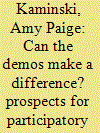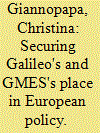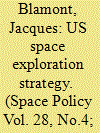|
|
|
Sort Order |
|
|
|
Items / Page
|
|
|
|
|
|
|
| Srl | Item |
| 1 |
ID:
120643


|
|
|
|
|
| Publication |
2012.
|
| Summary/Abstract |
The vision of the Global Earth Observation System of Systems (GEOSS) is the achievement of societal benefits through voluntary contribution and sharing of data, metadata and products at no or minimum cost. Such undertakings, where contribution provides positive externalities, benefiting contributors and non-contributors alike, are often described as 'social dilemmas', usually resulting in small levels of voluntary contribution. We investigate the benefits and challenges of voluntary contribution to GEOSS, surveying economic and game theoretic literature and examining how the concepts of social dilemmas apply to the provision of GEOSS. We conduct an exploratory survey among individuals involved in the Group on Earth Observation (GEO) to understand their perception of voluntarily contribution. Even though contribution to GEOSS was perceived as rather low, e.g. because of a perceived lack of funds, commitment or organization, survey respondents also perceived many (exclusive) benefits of contribution, e.g. networking, visibility for their work or collaborating with motivated individuals. To increase participation, respondents suggested increasing financial support and raising awareness of GEOSS. We conclude that communicating the efficacy of individuals' contributions, the personal benefits of contribution and strengthening of group identity and knowledge about fellow participants' work can constitute incentives for future voluntary contribution. This could be facilitated by an externally established institution providing a framework for cooperation, or by institutions, agreements or frameworks agreed upon by contributors themselves.
|
|
|
|
|
|
|
|
|
|
|
|
|
|
|
|
| 2 |
ID:
120641


|
|
|
|
|
| Publication |
2012.
|
| Summary/Abstract |
US space exploration policy deliberations tend not to include citizens who lack direct, vested financial interests in the space enterprise. Could expanding the circle of US space policy development players to involve citizens more aptly serve space exploration and the interests of American democratic society in the 21st century? I evaluate the merits and feasibility of citizen participation, drawing upon democratic theory and scholarship analyzing public participation in techno-scientific matters, previous experiences of public involvement in space exploration policy formation, and reflections on my professional experiences in space policy development. I argue that public engagement will enrich the debate surrounding the US future in space and may point toward a program American citizens will support as a meaningful future in the cosmos. I suggest three guiding principles and outline four mechanisms that, if embraced by US space policy makers, could foster meaningful public participation in informing the US space exploration agenda.
|
|
|
|
|
|
|
|
|
|
|
|
|
|
|
|
| 3 |
ID:
120649


|
|
|
|
|
| Publication |
2012.
|
| Summary/Abstract |
This paper explores the possible relationship between space exploration and long swings in the economy and socio-technical systems. We posit that the early phases of long upswings are characterized by periods of optimism and the spirit of adventure that provided a motivation for large-scale explorations and other great infrastructure projects in the past. These Maslow Windows help us understand prior eras of exploration and cultural dynamism, and offer a hopeful scenario for space exploration in the next two decades. We offer some observations as to what the exploratory thrust might look like, including a return to the lunar surface combined with other activities. Of course, we also point out that the next great wave of space exploration will almost certainly have a much more international flavor than has heretofore been the case.
|
|
|
|
|
|
|
|
|
|
|
|
|
|
|
|
| 4 |
ID:
120639


|
|
|
|
|
| Publication |
2012.
|
| Summary/Abstract |
The USA adopted a new defence strategy in 2012 which responds to the changing geopolitical landscape and straightened economic circumstances. The emphasis is on leaner, more flexible and diversified operations, while priority areas have shifted from Europe to the Asia-Pacific (in acknowledgement of China's growing military might) and the Middle East. This will have consequences for Europe, which is now expected to take a greater share of the strategic burden. The major developments in the strategy - such as eschewing the pursuit of lengthy engagements on more than one front, and using the military to complement diplomatic and economic initiatives - are discussed. Europe is urged to respond by maintaining its national strategic and industrial autonomy, including in access to space and missile defence.
|
|
|
|
|
|
|
|
|
|
|
|
|
|
|
|
| 5 |
ID:
120638


|
|
|
|
|
| Publication |
2012.
|
| Summary/Abstract |
This viewpoint explores how a strengthening of Europe-Japan cooperation in four categories of space-related activities (exploration and access to space; Earth observation and related applications; industry-to-industry cooperation; and space security) can contribute to the EU-Japan strategic partnership more broadly. It is argued that integrating key space portfolios into existing venues and agendas for bilateral consultations and decision-making has the potential to bolster the overarching objective of deepening further political, economic, commercial, societal and cultural relations.
|
|
|
|
|
|
|
|
|
|
|
|
|
|
|
|
| 6 |
ID:
120644


|
|
|
|
|
| Publication |
2012.
|
| Summary/Abstract |
As NASA works to redefine the meaning of its mission, two social scientists apply tools from phenomenology to explore how an agency, on the cusp of new thought, is tasked with discovery. Sources for the analysis include interviews, observations, case files and documents before and after a site visit to Johnson Space Center in Houston, Texas. Findings suggest that NASA should consider creating an internal office of phenomenological inquiry designed to recognize phenomenology at work as a fundamental approach for discovery. A special note of appreciation is extended to NASA for fostering and encouraging access to their organization to observe operations at the side of astronauts in training, engineers and scientists at work, and managers overseeing a Space Shuttle mission.
|
|
|
|
|
|
|
|
|
|
|
|
|
|
|
|
| 7 |
ID:
120645


|
|
|
|
|
| Publication |
2012.
|
| Summary/Abstract |
The 2007 US National Research Council Decadal Survey for Earth Science and Applications from Space was the first consensus perspective produced by the US Earth Science community of the relative priorities among a sequence of 17 satellite missions over the course of the next decade. However, the Decadal Survey only captured the perspective of the science community, leading to questions about the inclusion of broader priorities from constituent communities and stakeholders. We present a stakeholder value network analysis for the NASA/NOAA Earth Observation Program. The analysis includes a rigorous articulation of the needs and objectives of 13 major stakeholders and a complete stakeholder value network with 190 individual "value flows" that capture the interactions between all the stakeholders. It produces a novel stakeholder map, graphically indicating the outputs most likely to create a lasting Earth Science program. The most important value loops and program outputs are used to derive a set of high-level program goals that suggest what NASA and NOAA should do, as well as how they should conduct business. The analysis concludes that international partnerships represent a strong potential partner for certain science missions with greater potential value delivery than currently-prioritized efforts with defense stakeholders and concludes that weather and land-use missions, in addition to climate missions, should be given highest priority; water, human health, and solid Earth missions should be given lower priority based on each science category's potential for delivering value to the entire stakeholder network.
|
|
|
|
|
|
|
|
|
|
|
|
|
|
|
|
| 8 |
ID:
120642


|
|
|
|
|
| Publication |
2012.
|
| Summary/Abstract |
While the international community has acted forcefully since World War II to protect sites and objects of cultural or historic significance on Earth, little attention has been paid to the same kinds of sites and objects in space. There are important ethical and scholarly reasons for wanting to preserve sites and in situ objects in off-Earth contexts from destruction or commercial exploitation. Innovative space research equipment, such as spacecraft, satellites, and space stations, and the locations of historic missions, such as Tranquility Base, therefore deserve formal international recognition and protection. Appropriate models for developing a comprehensive protective scheme can be found in existing international protocols, especially the 1959 Antarctic Treaty (and later additions), the 1970 UNESCO Convention on Cultural Property, the 1972 UNESCO World Heritage Convention, and the 2001 UNESCO Convention on the Underwater Cultural Heritage. In addition, space agencies and professional organizations can mandate adequate and ethical planning for the post-operational phases of space missions to include arrangements for heritage protection.
|
|
|
|
|
|
|
|
|
|
|
|
|
|
|
|
| 9 |
ID:
120646


|
|
|
|
|
| Publication |
2012.
|
| Summary/Abstract |
The successful realisation of the flagship programmes, Galileo/EGNOS and GMES has been in doubt as a result of the current financial constraints. In providing an overview of the role of these two programmes in relation to implementing European policies - with sector-by-sector information on the ways they can help fulfil specific EU objectives - this paper attempts to demonstrate why and how they must be successfully operationalised. It therefore continues by analysing their political, economic, social, technological, environmental and legal strengths and weaknesses and makes policy recommendations on this basis. Utilising these flagship programmes to carry through major European policies will be crucial for realising their great potential and achieving the Europe 2020 goals of the European Union.
|
|
|
|
|
|
|
|
|
|
|
|
|
|
|
|
| 10 |
ID:
120647


|
|
|
|
|
| Publication |
2012.
|
| Summary/Abstract |
Since the establishment of the United Nations Committee on the Peaceful Exploration and Uses of Outer Space (COPUOS) in 1959, many actions that affect the advancement of the space frontier have been taken, within and outside COPUOS, in the interest of the global community, but without much input from Africa. Yet a number of African countries have joined those with assets in space, albeit without the necessary infrastructure on the ground. These actions vary in scope, in importance and in participation; however, they affect us all. Examples include the legal instruments that are in operation today for the exploration and peaceful uses of outer space, sustainability of the outer space environment and the Global Exploration Strategy- Framework for Coordination (GES-FC), conceived by 14 spacefaring nations; this laid out the details needed for an active global space exploration programme. This paper reflects on existing space-related regional cooperation arrangements at the inter-governmental level, including the African Leadership Conference on Space Science and Technology for Sustainable Development (ALC). Noting that, despite UN General Assembly endorsement of the need for developing countries to have access to the International Space Station (ISS), almost all in Africa have not, it asks what Africa might gain from such an experience. The paper concludes with an examination of where and why Africa needs to focus its immediate space-related efforts - on the ground here on Earth or in outer space?
|
|
|
|
|
|
|
|
|
|
|
|
|
|
|
|
| 11 |
ID:
120637


|
|
|
|
|
| Publication |
2012.
|
| Summary/Abstract |
Despite the importance of space to modern life, the public has lost interest in its most human aspect, exploration. This is because spacefaring nations, and especially the USA, have clung on to outmoded cold war ways of thinking about it. The US attitude of 'command' over its international partners will no longer work and we must instead adopt a new, inclusive paradigm in the 'wiki' mould. With different countries leading different facets of a global, cooperative endeavour, and contributions reciprocated in ways valuable to all participants (e.g. through access to know-how or capacity building) there is a real possibility of advancing beyond near-Earth orbit. Keeping the ISS open for the training of future long-duration crews would be the first step in a unified human drive to the Moon, involving first a robotic village and then an international base, with Mars an ultimate goal. It the USA were to reorient its thinking towards such a project it would demonstrate true leadership.
|
|
|
|
|
|
|
|
|
|
|
|
|
|
|
|
|
|
|
|
|